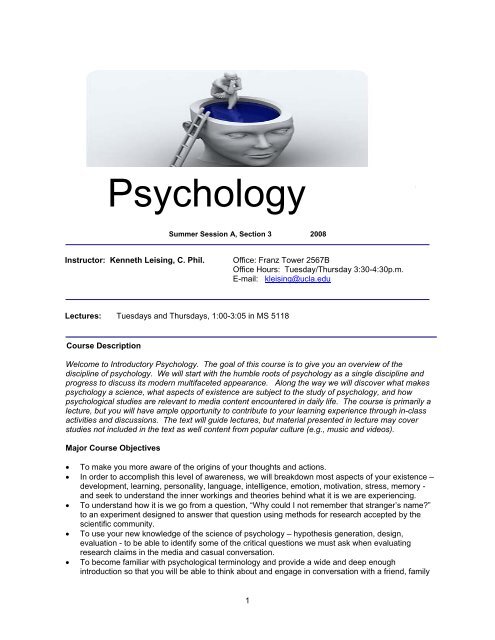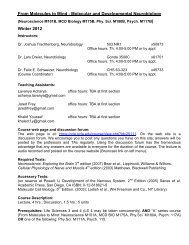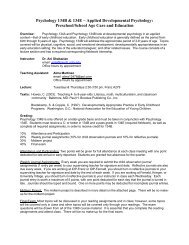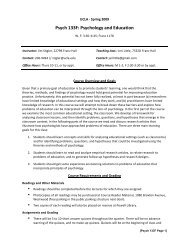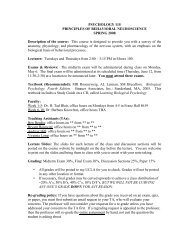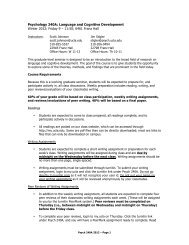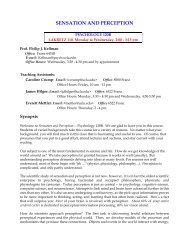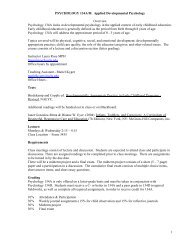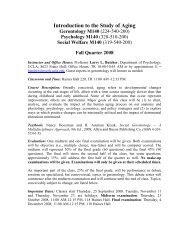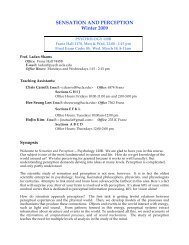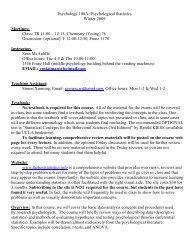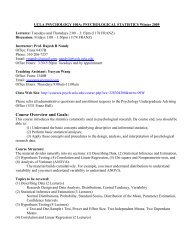Psychology 135: - Courses in Psychology - UCLA
Psychology 135: - Courses in Psychology - UCLA
Psychology 135: - Courses in Psychology - UCLA
You also want an ePaper? Increase the reach of your titles
YUMPU automatically turns print PDFs into web optimized ePapers that Google loves.
<strong>Psychology</strong>Summer Session A, Section 3 2008Instructor: Kenneth Leis<strong>in</strong>g, C. Phil.Office: Franz Tower 2567BOffice Hours: Tuesday/Thursday 3:30-4:30p.m.E-mail: kleis<strong>in</strong>g@ucla.eduLectures: Tuesdays and Thursdays, 1:00-3:05 <strong>in</strong> MS 5118Course DescriptionWelcome to Introductory <strong>Psychology</strong>. The goal of this course is to give you an overview of thediscipl<strong>in</strong>e of psychology. We will start with the humble roots of psychology as a s<strong>in</strong>gle discipl<strong>in</strong>e andprogress to discuss its modern multifaceted appearance. Along the way we will discover what makespsychology a science, what aspects of existence are subject to the study of psychology, and howpsychological studies are relevant to media content encountered <strong>in</strong> daily life. The course is primarily alecture, but you will have ample opportunity to contribute to your learn<strong>in</strong>g experience through <strong>in</strong>-classactivities and discussions. The text will guide lectures, but material presented <strong>in</strong> lecture may coverstudies not <strong>in</strong>cluded <strong>in</strong> the text as well content from popular culture (e.g., music and videos).Major Course Objectives• To make you more aware of the orig<strong>in</strong>s of your thoughts and actions.• In order to accomplish this level of awareness, we will breakdown most aspects of your existence –development, learn<strong>in</strong>g, personality, language, <strong>in</strong>telligence, emotion, motivation, stress, memory -and seek to understand the <strong>in</strong>ner work<strong>in</strong>gs and theories beh<strong>in</strong>d what it is we are experienc<strong>in</strong>g.• To understand how it is we go from a question, “Why could I not remember that stranger’s name?”to an experiment designed to answer that question us<strong>in</strong>g methods for research accepted by thescientific community.• To use your new knowledge of the science of psychology – hypothesis generation, design,evaluation - to be able to identify some of the critical questions we must ask when evaluat<strong>in</strong>gresearch claims <strong>in</strong> the media and casual conversation.• To become familiar with psychological term<strong>in</strong>ology and provide a wide and deep enough<strong>in</strong>troduction so that you will be able to th<strong>in</strong>k about and engage <strong>in</strong> conversation with a friend, family1
member, or psychology professor about the most <strong>in</strong>fluential topics of the field.• To ignite a sense of curiosity that may lead you to become a psychologist <strong>in</strong> your own way, whether<strong>in</strong> your personal or professional lives, or both.Learn<strong>in</strong>g Resources and Teach<strong>in</strong>g MethodsWe will use many different learn<strong>in</strong>g resources to <strong>in</strong>troduce you to <strong>Psychology</strong> and few methods forevaluat<strong>in</strong>g your understand<strong>in</strong>g of the course content; (A) the textbook, (B) lectures, (C) <strong>in</strong>-class quizzesand exercises, (D) <strong>in</strong>-class group presentation, (E) office hours, (F) experimental participation and/orarticle summaries, (G) midterm, and (H) f<strong>in</strong>al exam. These are each outl<strong>in</strong>ed <strong>in</strong> more detail below.A. The Textbook: Lilienfeld, S.O., Lynn, S.J., Namy, L.L., Woolf, N.J. (2009). <strong>Psychology</strong>: FromInquiry to Understand<strong>in</strong>g. Boston, MA: Allyn and Bacon Publishers.The textbook is required and can be purchased at the campus bookstore. A copy of the text is alsoavailable for 2-hour reserve at Powell Library.B. The Lectures: Lectures are <strong>in</strong>tended to help clarify some of the particularly difficult topics covered<strong>in</strong> the text. My lectures will also differ from the textbook somewhat. Sometimes we will look more<strong>in</strong>tensively at particular topics, resourc<strong>in</strong>g the orig<strong>in</strong>al research studies, updat<strong>in</strong>g certa<strong>in</strong> topics withcutt<strong>in</strong>g edge research, and apply<strong>in</strong>g topics to real life events. We will also occasionally show videosand try demonstrations that are not described <strong>in</strong> your text. You are strongly encouraged to attend allclass meet<strong>in</strong>gs.I will provide PowerPo<strong>in</strong>t outl<strong>in</strong>es of my lectures with several key def<strong>in</strong>itions and sections of contentmiss<strong>in</strong>g. The miss<strong>in</strong>g sections will be filled <strong>in</strong> and expla<strong>in</strong>ed dur<strong>in</strong>g lecture. I f<strong>in</strong>d this is a happymedium between <strong>in</strong>structors who provide noth<strong>in</strong>g and cause students to write feverishly while try<strong>in</strong>g topay attention, and those <strong>in</strong>structors who provide all the <strong>in</strong>formation <strong>in</strong> the PowerPo<strong>in</strong>t and enablestudents to skip lecture because they th<strong>in</strong>k they have all the <strong>in</strong>formation they need.Assessment:Your f<strong>in</strong>al grade <strong>in</strong> this course will be determ<strong>in</strong>ed by:In-Class Exercises: 5%Presentation: 10%5 In-Class Quizzes: 15%Midterm: 35%F<strong>in</strong>al: 35%100%C. In-class exercises and quizzes: Five <strong>in</strong>-class exercises and five <strong>in</strong>-class quizzes are scheduled.Quizzes will occur at 1:02 (beg<strong>in</strong>n<strong>in</strong>g of class). No one arriv<strong>in</strong>g late will be given extra time on aquiz - so don’t be late! Each quiz will consist of 5 questions presented <strong>in</strong> various formats: multiplechoice,short answer, match<strong>in</strong>g, or a comb<strong>in</strong>ation of the three. All quizzes will cover materialpresented <strong>in</strong> the textbook and lectures (<strong>in</strong>clud<strong>in</strong>g demonstrations, exercises, and videos) andassigned read<strong>in</strong>gs. In-class exercises will be graded either pass or fail.No make-up exercises or quizzes can be given. However, your f<strong>in</strong>al quiz/assign grade will be basedon your highest 4 scores from the quizzes and highest 4 scores from <strong>in</strong>-class assignments. Thatmeans your lowest quiz and <strong>in</strong>-class assignment scores will not count. If you miss a quiz orassignment you receive a score of zero for that quiz/assignment. Each quiz is worth 3.75% of yourf<strong>in</strong>al grade and each assignment is worth 1.25% of your f<strong>in</strong>al grade.D. Group Presentation: Presentations are scheduled for Tuesday, July 22 nd . Each group will berequired to give a 5-7 m<strong>in</strong>ute <strong>in</strong>fomercial on a product of their choos<strong>in</strong>g. Each member mustcontribute to the presentation. More <strong>in</strong>formation on the presentation will be given on the day of themidterm.2
E. Office Hours: Please visit dur<strong>in</strong>g office hours!!! Office hours allow me to deliver personalizedanswers to difficult concepts covered <strong>in</strong> class. It is my s<strong>in</strong>cere promise to do my best to make sureyou feel comfortable with a concept before you leave my office. My patience is never end<strong>in</strong>g andmy door is always open (dur<strong>in</strong>g office hours). If your schedule conflicts with my weekly officehours, meet<strong>in</strong>gs may be arranged by appo<strong>in</strong>tment. You can also contact me by e-mail.F. Experiment Participation and/or Article Summaries: Students enrolled <strong>in</strong> <strong>Psychology</strong> 10 arerequired to serve as psychological research subjects for a total of six hours or write three abstractsand articles from psychology journals, or do a comb<strong>in</strong>ation of both. Please see the full descriptionat the end of this syllabus.G. One midterm exam is scheduled for Thursday, July 10 th , <strong>in</strong> our normal classroom and it will startat the beg<strong>in</strong>n<strong>in</strong>g of class. The midterm exam will consist of 30 multiple-choice and 5 short answerquestions and will contribute 35% of your f<strong>in</strong>al grade.H. The f<strong>in</strong>al exam will be held on Thursday, July 31 st , 1:00 - 3:05 pm <strong>in</strong> our normal classroom(unless otherwise <strong>in</strong>dicated <strong>in</strong> class). The f<strong>in</strong>al exam will also consist of 30 multiple choice and 5short answer. The f<strong>in</strong>al exam will cover only that material presented <strong>in</strong> the lectures and read<strong>in</strong>gss<strong>in</strong>ce the midterm. It will contribute 35% of your f<strong>in</strong>al grade.Some important notes about the exams: All exams will cover material presented <strong>in</strong> lectures (<strong>in</strong>clud<strong>in</strong>gdemonstrations and videos) and assigned read<strong>in</strong>gs. The material covered on each exam is listed on thesyllabus. On exam days, br<strong>in</strong>g pencils and erasers. Exams will start on time and no one arriv<strong>in</strong>g late willbe allowed to start writ<strong>in</strong>g the exam after the first person has left the room - so don’t be late. Scantronanswer sheets will be provided. Scores will be posted on my.ucla.edu. Although answer sheets will notbe returned to you, you are encouraged to review them dur<strong>in</strong>g office hours.Make-up exams will be permitted only <strong>in</strong> situations of illness or medical emergency.If such circumstances do exist, you will be required to notify me prior to the exam if at all possible. Youwill also be required to present appropriate documentation (e.g., physician’s verification). Students whomiss an exam without previously <strong>in</strong>form<strong>in</strong>g me and who cannot provide documentation will receive a zerofor that exam. Be sure to plan ahead because I cannot allow make-ups for events like exam schedul<strong>in</strong>gproblems or early trips home!Each exam will <strong>in</strong>clude a 2-po<strong>in</strong>t bonus question of a to-be-determ<strong>in</strong>ed format. Sorry, but no other form ofextra-credit is available <strong>in</strong> this course. Grades will be assigned on a standard curve assigned by thepsychology department. A distribution of the marks will be posted on the class website follow<strong>in</strong>g eachexam to give you an idea of how you are do<strong>in</strong>g relative to others.I. <strong>Psychology</strong> 10, Section 3, Class Lecture and Read<strong>in</strong>g Schedule – Summer 2008Dates are subject to change.Date Lecture Topics Read<strong>in</strong>g Quizzes/ActivitiesWeek 1 T: 06/24 Lecture topic: What is psychology and how is it ascience?Pgs. 2-13, 24-43 Register on Experimetrix.Activity: Wason 2-4-6 TaskTR: 06/26 Lecture topic: Research Methods Pgs. 64-90, 94-98 Activity: Design your ownexperiment*Week 2 T: 07/01 Lecture topic: Learn<strong>in</strong>g Pgs. 233-253,257-267Quiz #1: ResearchmethodsMultimedia PresentationTR: 07/03Lecture topic: The biological basis of behavior.Memory: the good, the bad, and the forgotten.Pgs. 274-300, 129-136, 142-145Quiz #2: Learn<strong>in</strong>gActivity: Mouse PartyActivity: Fun with memorytechniques3
Week 3 T: 07/08 Lecture topic: Language and Intelligence Pgs. 323-334,355-363, 375-387TR: 07/10Midterm Exam: Includes read<strong>in</strong>gs up to and<strong>in</strong>clud<strong>in</strong>g 07/08.Pgs. 398-428Developmental <strong>Psychology</strong>Week 4 T: 07/15 Lecture topic: Emotion, Motivation, and Stress Pgs. 446-455,469-487, 494-503Activity: Excerpts fromvarious IQ testsActivity: Explor<strong>in</strong>g StressReductionTR: 07/17 Lecture topic: Personality Pgs. 578-602 Quiz #3: Emotion,Motivation, and StressActivity: Fake v. Genu<strong>in</strong>esmiles*Week 5 T: 07/22 Lecture topic: Social <strong>Psychology</strong> Pgs. 534-571 Quiz #4: Who we are(Personality)Activity: Present your ownad commercial.TR: 07/24 Lecture topic: Cl<strong>in</strong>ical Pgs. 624-627,639-665,Week 6 T: 07/29 Lecture topic: Cl<strong>in</strong>ical <strong>Psychology</strong> - Treatments Pgs. 672-693,699-703TR: 07/31Quiz #5: How we fit <strong>in</strong>(Social)Activity: Case StudiesActivity: Role Play – Guessthe technique*FINAL EXAM*F<strong>in</strong>al Exam is scheduled for Thursday, July 31, 2008, 1 - 3:05 pm (normal class time) and<strong>in</strong>cludes only those materials covered s<strong>in</strong>ce the midterm*Additional Resources and Course InformationCourse Website:How do I get to the course site?Go to: http://www.lsic.ucla.edu/ (case sensitive)Use Bru<strong>in</strong> OnL<strong>in</strong>e (BOL) IDs as your Username.Your password is your 9-digit student ID number.After logg<strong>in</strong>g <strong>in</strong> to the follow<strong>in</strong>g site you will see our course site listed along with all of the other coursesyou are tak<strong>in</strong>g that uses the blackboard system.If you don’t have a BOL account you can get one here:http://www.bol.ucla.edu/services/accounts/If you have trouble logg<strong>in</strong>g on to the course site, please send an e-mail to webpages@psych.ucla.edu.Computer Labs:Students may use the <strong>Psychology</strong> computer labs at 2434 Franz Hall (2nd floor of Franz Tower, Phone:(310-206-0638), 3290 Franz Hall (3rd floor of Middle build<strong>in</strong>g, Phone: (310-206-9885), 3351/3260 FranzHall (3rd floor of Middle build<strong>in</strong>g, Phone: (310-206-9885) and 3312 Franz Hall (3rd floor of Middlebuild<strong>in</strong>g, Phone: (310-206-3447) to access course <strong>in</strong>formation from web pages. The rooms have differentopen hours depend<strong>in</strong>g on when classes are scheduled but they try to have at least one of these roomsopen for student use between 9-5, Mon-Fri. If you are not familiar with how to use a course web page, alab proctor will happy to assist you.Accommodations for Students with Disabilities:We will make every effort to accommodate the needs of students with disabilities. Please let me knowof any special requirements as early <strong>in</strong> the quarter as possible so that I can ensure that appropriateaccommodations are made.4
COMPLETING EXPERIMENT PARTICIPATION AND/OR ARTICLE SUMMARIESAs a student <strong>in</strong> this course, you will have the opportunity to participate <strong>in</strong> current, cutt<strong>in</strong>g-edge researchtak<strong>in</strong>g place <strong>in</strong> the <strong>UCLA</strong> <strong>Psychology</strong> Department. All students enrolled <strong>in</strong> Psych 10 are required to earn6 research credits by serv<strong>in</strong>g as participants <strong>in</strong> psychological research. Each study you participate <strong>in</strong> istypically worth one research credit. If it is worth more than one credit, this will be listed <strong>in</strong> the experimentdescription. For students who would prefer not to participate <strong>in</strong> research, you have the alternative ofwrit<strong>in</strong>g three summaries of articles from psychology journals (each summary is worth 2 research credits).You may also do a comb<strong>in</strong>ation of both research participation and article summaries.Obta<strong>in</strong><strong>in</strong>g the 6 research credits is a requirement for the course. Please note that students whodo not complete this research requirement by the last day of <strong>in</strong>struction will receive a grade ofIncomplete ("I") <strong>in</strong> Psych 10. In order to remove the "I", the research requirement will have to be fulfilledthe follow<strong>in</strong>g quarter or else the "I" will lapse <strong>in</strong>to an "F" (or "NP"). Students who received an "I" <strong>in</strong> theprior quarter they took Psych 10 can apply any accumulated credit towards the six hours of experimentcredit needed to receive a grade for Psych 10. Students who DROP Psych 10 after hav<strong>in</strong>g served as aresearch participant CANNOT apply any accumulated credit towards the next time they take thecourse. So please don’t leave yourself out <strong>in</strong> the cold by putt<strong>in</strong>g off all the participation until the end ofthe quarter… start early.How to participate <strong>in</strong> research. The post<strong>in</strong>g and schedul<strong>in</strong>g of experiments is handled via an onl<strong>in</strong>eschedul<strong>in</strong>g system. To access the system, go to http://experimetrix.com/ucla orhttps://experimetrix2.com/<strong>UCLA</strong>/ (a l<strong>in</strong>k to experimetrix is also vailable on the course site). Be sure toselect read.me and follow the detailed <strong>in</strong>formation on how to use this system. The f<strong>in</strong>al day to receivecredit for experimetrix for Spr<strong>in</strong>g Quarter 08 is Thursday, July 25 (5 th Week). If you choose to participate<strong>in</strong> an experiment on July 25 th you must make sure the experimenter gives you credit that even<strong>in</strong>g beforethe site closes at midnight. Please note that you must assign credits you receive to our "Psych 10"course <strong>in</strong> order for your credit to appear on your Credit Balance Report at the end of the quarter.Note that you must be registered with the Onl<strong>in</strong>e Experiment Schedul<strong>in</strong>g System before you canserve as a subject.If you have trouble register<strong>in</strong>g on experimetrix please contact Janet Vera at jvera@psych.ucla.edu.Writ<strong>in</strong>g Journal Article SummariesAnother way that you may fulfill the research requirement for Psych 10 is by summariz<strong>in</strong>g reports ofpsychological research. Completion of each article summary will give you two research credits. Thus,three article summaries will fulfill the six-credit research requirement. You may comb<strong>in</strong>e written articlesummaries with experiment participation. For example, you may choose to write one summary (for twocredits) and take part <strong>in</strong> four experiments (for four credits).How to write journal article summaries.1. You can f<strong>in</strong>d psychology journals at the College Library (Powell) or the Biomedical Library. Thearticles must come from scientific psychology journals, not reports from magaz<strong>in</strong>es,newspapers, or the media.2. Write a one-page summary of the article. A complete article summary will <strong>in</strong>clude the follow<strong>in</strong>g(Don’t worry if some of these terms sound unfamiliar to you we will discuss them when wecover research methods.):5
• A few sentences summariz<strong>in</strong>g the study’s hypotheses.• A description of the study’s methods and an identification of the type of design it used (i.e.,case study, survey, correlational, experimental).• A statement of the <strong>in</strong>dependent variable(s) and how they were measured or manipulated.• A statement of the dependent variables and how they were measured.• A statement of the f<strong>in</strong>d<strong>in</strong>gs <strong>in</strong> your own words (i.e., were the IV and DV significantly related toeach other? If so, <strong>in</strong> what direction?).• A critical evaluation of the conclusions of the study. What is the general conclusion of thestudy? Do you th<strong>in</strong>k the methods and f<strong>in</strong>d<strong>in</strong>gs of the study supported this conclusion? Arethere any other alternative explanations for the f<strong>in</strong>d<strong>in</strong>gs?3. Your summary must be typed and double-spaced. Be sure to provide a complete reference forthe article, <strong>in</strong>clud<strong>in</strong>g the author, title, name of journal, publication date, and page number at thetop of the summary as <strong>in</strong> the follow<strong>in</strong>g example: Smith, B.J., & Jones, R.T. (1993). Mentalillness and social support. Psychological Science, 14, 207-219.4. You must hand <strong>in</strong> the first page and abstract of the article(s) you summarize with your reportsby Tuesday. July 29 th <strong>in</strong> class. If you cannot attend class that day arrange a time with me tohand <strong>in</strong> your articles. Please, do NOT slide papers under my door because my office may beused by others.6


